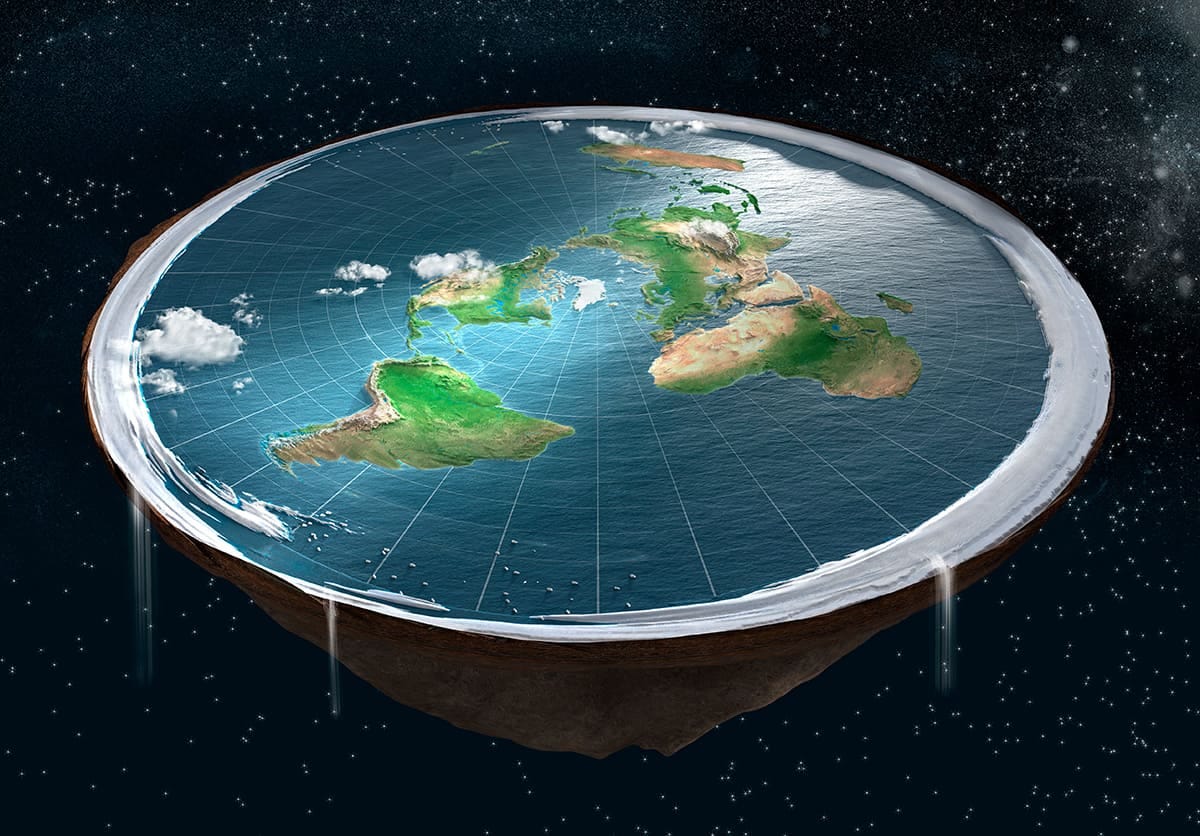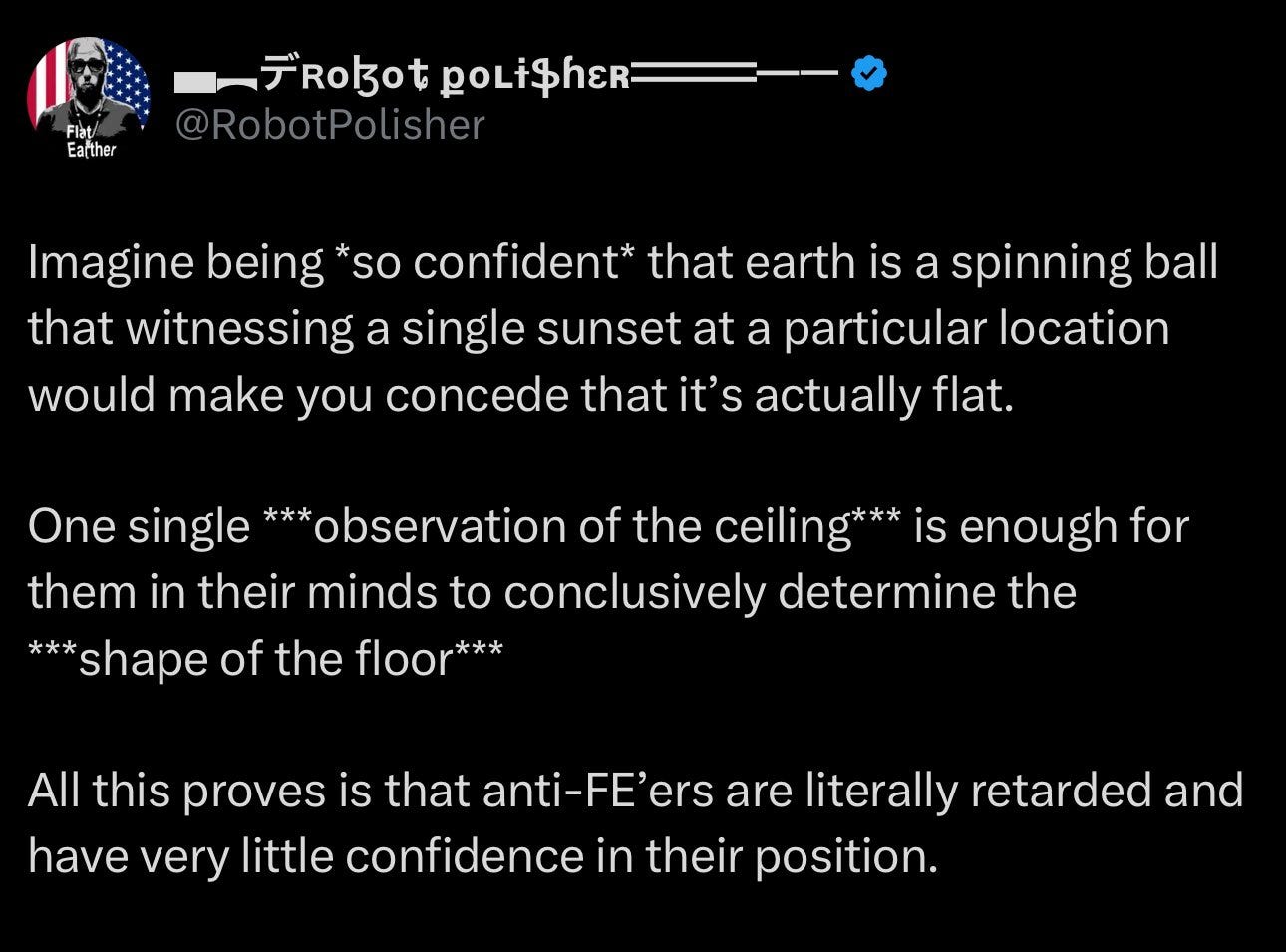Flat Earthers and Belief in Belief
What flat earthers can teach us about politics
Circling Around the Argument
Christian pastor Will Duffy has been working on a grand project that he’s dubbed The Final Experiment. The experiment is pretty simple - Duffy wanted to fly a group of prominent Flat Earth conspiracy theorists to Antarctica and let them see for themselves that they are wrong. This week, after years of preparation, he finally pulled it off.
If you are extremely lucky, you’ve never heard of Flat Earthers before. They’re exactly what the name implies - they think the Earth is flat, not a globe. This is a deeply wrong idea that was disproved as far back as the ancient Greeks, but it hasn’t stopped Flat Earth from being a popular conspiracy theory with formal organizations, conferences, and influencers.
Will Duffy was tired of it, so he offered some of the most popular Flat Earth influencers a chance to visit Antarctica themselves.
Antarctica holds a central place in most Flat Earth conspiracy theories. It’s the ‘edge’ of the disk, like so:
Most Flat Earthers will tell you some combination of the following is true:
You can’t travel to Antarctica because international organizations block access as part of the Globe Earth Conspiracy.
If you did travel there, you’d see the Ice Wall that surrounds the planet at it’s edge.
Reports of a 24-hour sun in Antarctica are fabricated, as there’s no real way for that to happen in Flat Earth models of space.
Duffy offered to prove them wrong. Many popular Flat Earthers with hundreds of thousands of social media followers accepted, and last week they flew to Antarctica to see for themselves.
Arguments Falling Flat
The results were exactly what every non-conspiracy theorist said they would be. The influencers were allowed to travel to Antarctica. They were not stopped and they could not find evidence of an Ice Wall or an edge to the Earth. And the sun did indeed stay in the sky continuously for days on end.
The easy thing to do here would be to point and laugh at the idiots. And some of that is probably appropriate. There are a lot of jokes going around1 and quite a few people who made fools of themselves.
Some people were extremely gracious about being wrong. Flat Earther Jeran Campanella has 164,000 subscribers on YouTube, and pretty flatly admitted “Sometimes you are wrong in life. And I thought that there was no 24-hour sun… and it’s a fact. The sun does circle you in the south.” He then said he knows he’ll likely be attacked by other Flat Earthers but that he has to report what he’s seeing.
Other Flat Earthers on the trip conceded the points about Antarctica but didn’t want to admit that it disproved their entire worldview. Austin Whitsitt said that “The point of this trip is to see if there’s a 24-hour sun. There clearly is … I don’t think it falsifies plane earth, I don’t think it proves a globe, I think it’s a singular data point.” The Flat Earthers on the trip were mostly subdued and humble about being proven wrong, but on social media things were a bit different:
As I pointed out, the easy thing to do here is to make fun of these folks. I wouldn’t blame you for it, but it’s not what I want to do here - because there’s more happening here than meets the eye. There are patterns to how Flat Earthers think that can teach us valuable lessons.
In particular, the linked post above is from the flat earth X account ‘RobotPolisher’. That account, in 2023, was highly enthusiastic about a potential trip to Antarctica:
This person has posted for years about Flat Earth topics and seemed eager to challenge ‘Globe Earthers’ to go to Antarctica and prove it. But as it became apparent this year that this was actually going to happen, they changed their tone.
That post above was originally from May 2024 and was reposted on December 12th. Crucially, on December 12th the Flat Earth influencers were on their way to Antarctica but had not yet reached it. RobotPolisher began posting about how this didn’t matter before the Flat Earthers provided proof of the 24-hour sun and lack of Ice Wall. Before they even knew the results of the great experiment, they were making excuses - talking about how this wouldn’t actually prove anything, the experiment is flawed, you’re stupid for thinking this matters to the REAL debate, they might be paid shills, etc.
What’s going on here? Why did someone eager to talk about Antarctica all of the sudden decide Antarctica didn’t matter?
Belief in Belief
There are two kinds of belief. There are people who believe things, and people who believe they should believe things.
Carl Sagan proposes a classic thought experiment called the Dragon in the Garage that I’ll paraphrase here:
Imagine a friend tells you that they have a dragon in their garage. You ask if you can open the door and see the dragon, and they say no - you can open the door, but the dragon is actually invisible. You ask if you’ll be able to hear or smell the dragon. Your friend says that the dragon is scentless and famously quiet. You propose some ideas - let’s throw flour in the air so we can see the outline of the invisible dragon. It turns out, your friend says, that the dragon is permeable to flour. You propose using infrared vision to pick up the dragon’s heat signature, but your friend claims the dragon is perfectly room-temperature.
It eventually becomes clear that your friend doesn’t really believe there’s a dragon in the garage. They say they believe it. But when they walk through the garage, they don’t act as though there’s a dragon. They don’t expect to bump into scaly wings or to be incinerated by fiery dragon breath. They behave as though there’s nothing there. And crucially, when you propose various tests they come up with excuses ahead of time. They know the tests are going to fail, so they make up reasons why the tests don’t matter.
Your friend doesn’t really believe in the dragon, but they think that they should believe in the dragon. Perhaps everyone in their community is a dragon believer and they think they’re supposed to believe as well. Perhaps they see a political advantage to dragon belief. Perhaps they think that anti-dragoners are stuck up elitists and they don’t want to give them any satisfaction. But for whatever reason, it’s clear that while they claim to believe in the dragon, they don’t ever expect evidence of a dragon to emerge. This isn’t belief. This is believing in a belief.
Similarly, there are two types of Flat Earthers. The ones who flew down to Antarctica seem to have actually believed the earth is flat. They expected to be proven right and were at least somewhat contrite and introspective afterwards. As it was happening, some were visibly frustrated and confused. They actually believed and were experiencing a contradiction.
Social media reactions were from people who did not believe - but who believed in the belief. That’s what is happening when hordes of social media accounts switch from believing that Antarctica will prove them right to desperately backpedaling and claiming it proves nothing or was all CGI. They didn’t believe in the first place, they simply believed in the belief. If you’ve read my piece on Activism and Simulacra Levels, it’s a very similar idea - these folks are operating at Level 3 or worse. They wear beliefs as garments, as identity markers, not as literal descriptions of what they think is true. That’s why they began saying the Antarctica experiment didn’t matter before any of the results actually came in.
This is all very easy to notice when it’s Flat Earth stuff. Nobody reading this (hopefully) is a Flat Earth conspiracist, so it’s a clean and apolitical example. Some people are true believers who can have their minds changed while others will always resist being proven wrong because their belief is really a social identity, a political ploy, a belief in a belief rather than the belief itself.
What’s more difficult and more important to notice is when this happens in our political discussions.
Political Beliefs That Aren’t
My point here isn’t to go after the left or the right specifically - it’s to convince you this is happening all the time, wherever you look. So let’s look at examples on both ends of today’s political spectrum.
On the right, Donald Trump has been calling for increased tariffs for as long as he’s been in politics. He’s consistently denied that American companies or American consumers would pay the tariffs or that they would cause inflation, claiming that other countries pay the tariffs. But after winning re-election, he recently admitted that tariffs might actually increase prices for American consumers.
This is easy to explain for Trump himself - he could have just been lying. But what’s harder to explain is the reversal among all of Trump’s fans. For as long as Trump said it, they repeated the line about how tariffs wouldn’t cause inflation or hurt consumers. But now they’ve moved to different talking points, saying things like “I promise I’m fine never eating an avocado again if I can have a real country”.
Notice that the proposed tariffs haven’t even happened yet! If they ever actually believed in the tariffs-don’t-increase-prices line, they should still believe it. They can implement those tariffs and prove mainstream economists wrong. That’s still an option! If they literally believed what Trump was saying, they should be angry and confused about his reversal of opinion. But they never actually believed that - they just knew that they were supposed to believe it. They believed they should believe it. Now that Trump has shifted they’ve started making excuses ahead of time, just like the Flat Earthers.
On the left, something unusual happened recently when Joe Biden commuted the sentences of 1500 people. Virtually all of these 1500 were convicted of non-violent crimes and had already been moved to home confinement during COVID. This action was in response to progressive pressure groups who pushed for mass clemency for those under house arrest.
And yet as soon as these pardons were announced, prison abolitionists on social media were furious. It turns out that if you commute the sentences of a whole category of people - non-violent offenders under house arrest - some of them will still be pretty awful criminals! Most notably, one of the judges behind the Kids for Cash scandal was freed, and prison abolitionists were not happy about it. There were people with prison abolition in their bios posting about how they wanted some criminals to remain in jail!
Even when you give progressive groups exactly what they asked for, you still won’t get credit from progressives online. That’s the nature of internet leftism. But I think this in particular also shows that prison abolition is not a real belief - it’s a belief in a belief. It’s something that progressives or leftists feel like they need to support because of their politics. But when it actually happens and convicted criminals they find morally repugnant are freed, they’re not happy. They want prison abolition, but not for those bad people, only for the good people. When you ask them what ‘abolition’ means for the bad people, they give you this:
This is exactly the same kind of ‘reject and deny the question in advance’ strategy we see from the Flat Earthers, but this time with more of a refusal to engage at all. And if you offer the prison abolition groups exactly what they want, they get angry because they don’t literally believe nobody should be in prison. They just believe they should believe it.
You shouldn’t be endlessly cynical. Many people do actually believe the things they claim to believe in. But for a lot of folks, belief is not belief. It’s closer in nature to being a form of identity. Beliefs allow them to feel closer to a particular community, beliefs let them express their anger at the system, beliefs provide social advantages. Whether or not you actually believe is beside the point. It’s easy to see this with Flat Earthers. It’s much harder to see this within more politically charged topics - or to question whether or not *you* actually believe the things you say that you believe. But noticing is key, and it explains a lot of the contradictory politics you see on social media every day.
heh







I think, in a way, you’re giving many of these people too much credit.
Belief in Belief (as Dennett used it, anyway) was usually meant to mean that the person didn’t themselves “really” believe the thing, they know it’s not true, but instead they think it’s useful for other people to believe it - and so they will do things in accordance with making other people “really” believe it; things such as saying “this is true”. I don’t think most people are nearly this strategic.
Instead, I think this is more a case of “social beliefs”. Social beliefs are beliefs that are indistinguishable from non-social beliefs but only “become true” under certain social conditions. These “beliefs” feel just as true to their hosts as “normal” beliefs, the only difference being where/when they become activated. “Social beliefs” made it a lot easier for humans to form into coalitions, so we became very good at doing this, even when these beliefs seem to directly contradict other beliefs we also hold in our heads, sometimes even simultaneously.
It’s very hard to act as though you believe something that you don’t actually believe (belief in belief). The cognitive dissonance this creates is painful. Instead, our brains evolved to allow us to hold contradictory beliefs in our heads and “believe them” at different times, ways, or in different conditions. I think this is what we see far more often, including in this case.
This piece is fascinating. I’m also moved by the description of the flat earthers who, upon seeing Antarctica, embraced humility and accepted they were wrong. That is worth celebrating!